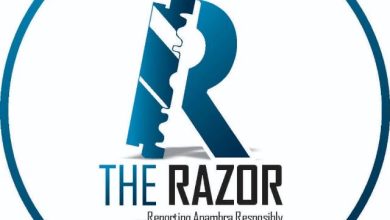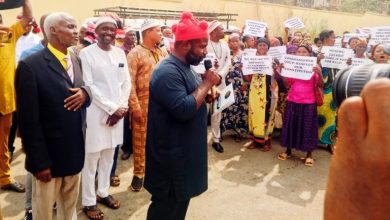Slug: All the Details of how INEC’s card readers worked in Anambra state field test
12 state of the federation including Anambra state were slated for field test of the cards to acquaint the staffs of the commission and the general public of how it intends to deploy the card readers to ensure a credible election.
The efficacy of the cards were first however contested following the duration of time it took to accredit a voter. Though the time varied, but it took between 10 seconds and 20 minutes for a voter to receive accreditation.
In most cases, the card reader rejected all the finger prints of the electorates, saying, ‘verification failed’, this is after identifying the permanent voters card of the electorate as being authentic.
Despite these, speaking with journalists, the Resident Electoral Commissioner(REC), Engr Edwin Offor Nwatarali declared that the card readers were in good shape and would work smoothly. He said that the snag of not capturing finger prints on time were fault of the electorates resulting from greasy or dirty fingers.
“We however overcame that by making the voters to wash their hands and cleaning them properly before coming to thumbprint. We believe that on the whole, the card will help us to have a good election.” He said.
Corroborating his view, the Senator representing Anambra South Zone, Senator Andy Uba who also observed the process said that the cards are working perfectly and will help to conduct a very credible election.
“From What I have been told by the INEC officials, the card reader shows the number of people that were registered in a polling unit, and once they are accredited it goes straight into the main server and at the end it shows the number of people accredited for the exercise.”
To this end, some people who believe that the card readers may marr the election considering that the card readers takes time to accredit a voter, and following that this was only a test exercise, and following the low turn out, they believe that the card readers may delay accreditation in the main election where there is expected to be a large turn out.
The secretary of Inter-Party advisory Council(IPAC) in Anambra State, Hon Isaac Onuka said the card readers may mar the election, calling on the INEC to return to the manual ways of accrediting voters as using the card reader may bring a huge confusion in the process and also delay it.
“How can you tell me that someone who came here and was registered, and his ten finger prints were captured comes back here to vote and you tell them that the same fingers have been rejected by the machine.
“Another thing is can the Card Reader which takes an average of 5 to 10 minutes to accredit a voter cover 300 voters between the period of 8am and 1pm? It is not possible. You must also consider the power of the card readers because what we noticed today is that working for just two hours, the machine lost 40% power. Can it perform the job on that day without failure? So I think we should go back to the old way of accreditation.”
A member of the civil society group, Mr Chris Azor of Civil Society Observation room said that is INEC must use the card readers, it must go back and look into the workings of the machine to ensure that there would not be hitches on the day of the election.
“In most cases people have to scrub their hands on the group just to ensure that the machine recognizes their print.”
Our correspondent reports that in some units, 50% of the voters were unable to have their finger prints verified by the card readers, but the REC assured that in cases like these where the card has been verified to be authentic, the commission could resort to manual accreditation.




